Vinegar is commonly used as a dressing for a number of food items from breads to salads, with fantastic pairings like olive oil and vinegar being a staple in American cuisine. However, vinegar isn’t just a great way to flavor a dish: vinegars come in many different forms and have many health benefits that you’ve probably never heard about.
What is Vinegar, Anyway?
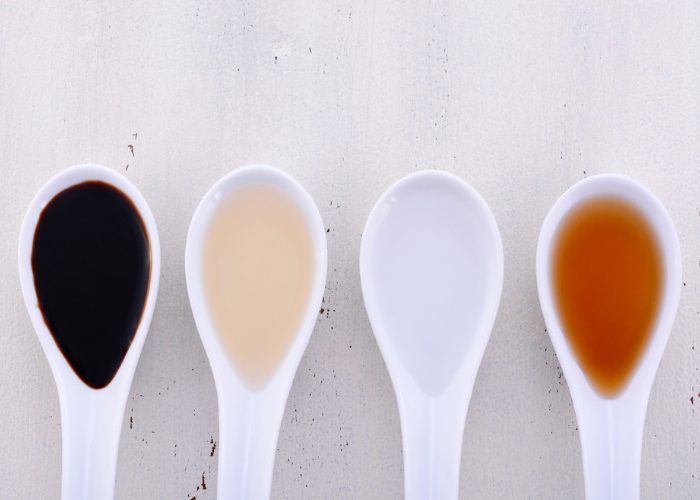
A vinegar is any form of acetic acid, including dilutions and fermentations that produce a liquid with a high concentration of acetic acid. There are many kinds of vinegars from different plant sources, and vinegar has achieved something of a cultural status as a “health food” with the rise of apple cider vinegar diets – even if the apple cider vinegar diet is a confirmed fad.
The physiological effects of consuming various vinegars depend on the dose and the type of vinegar consumed – there are very fine limits for the amount of vinegar that should be used in food, and drinking vinegar as part of a mixture is even more dangerous.
15 Different Types of Vinegar
You might only have ever used vinegar on a salad, but there are many varieties, from the classic balsamic vinegar to plum vinegar and beyond. Vinegar can be categorized along a number of lines, with the main types being distilled, cider, wine, rice vinegar, balsamic, beer, malt and cane.
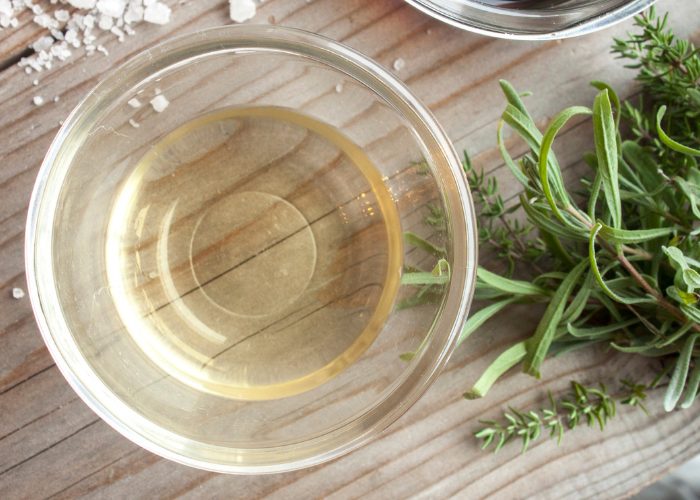
White (Distilled) Vinegar
The most common kind of vinegar, distilled white vinegar is often used on fries and other battered foods. This is the type of vinegar you probably have at home and it is derived from refined grains, making it one of the least nutritionally-valuable type of vinegar.
Apple Cider Vinegar
The apple cider vinegar diet is a known fad diet which sometimes gives this vinegar a bad reputation (or an excessively good reputation, perhaps), but is a pleasant fruity vinegar for use in dressing.
Balsamic Vinegar
A classic vinegar choice, combined with olive oil and used to dress salads and breads, balsamic vinegar is made from over-ripe grapes for a deep, rich flavor.

Cane Vinegar
A sugar-derived vinegar with a distinctive taste and texture, cane vinegar is derived from the fermentation of sugar cane, making it less nutrient-dense than fruit vinegars.
Coconut Vinegar
A vinegar produced from the nutrient-dense ruffage of the coconut, coconut vinegar has a mild and unique flavour, as well as the antimicrobial effects found in whole coconut.
Date Vinegar
Dates are a versatile fruit with a fantastic dark flavor, producing an equally distinctive vinegar.

Rice Vinegar
Rice vinegar is made from the fermentation of a rice wine (such as Sake and similar spirits), with a sharp flavor and three varieties: white, red, and black.
Black Vinegar
A distinctive, smoky vinegar found in many Chinese recipes, black vinegar is made from a combination of different grains and has positive effects on blood pressure by modulating cholesterol levels.
Blackcurrant Vinegar
With a mixture of dark and rich fruit tones, this vinegar is incredibly versatile and unique, and has the highest concentration of antioxidants of any fruit vinegar due to the incredible nutritional quality of blackcurrants.
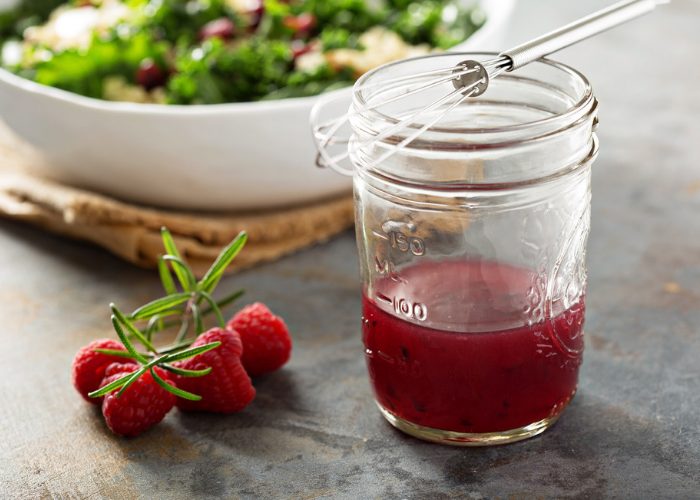
Raspberry Vinegar
Another fruit vinegar, raspberries provide a bright, sweet flavor.
Tomato Vinegar
Despite a sharper flavor, the familiar taste of tomato is strong in this fruit-based vinegar, with an increased concentration of carotenoids which boost the health of your eyes, hair, and skin.
Honey Vinegar
With a mixture of dark tones and sweetness, honey vinegar is distinctive and has a versatile flavor.

Kombucha
Kombucha tea is incredibly popular as a health food and, while the vinegar is relatively mild, it has the same probiotic effects, improving digestive health.
Palm Vinegar
With a variety of other palm products on the market, it’s no surprise that palm vinegar is common and ranges from mild to sharp flavors depending on fermentation methods.
Beer Vinegar
A golden-brown vinegar with a sharp, hoppy flavor, you can taste the type of beer used to make the vinegar.
Health Benefits of Vinegar
Kills bacteria and reduces infection
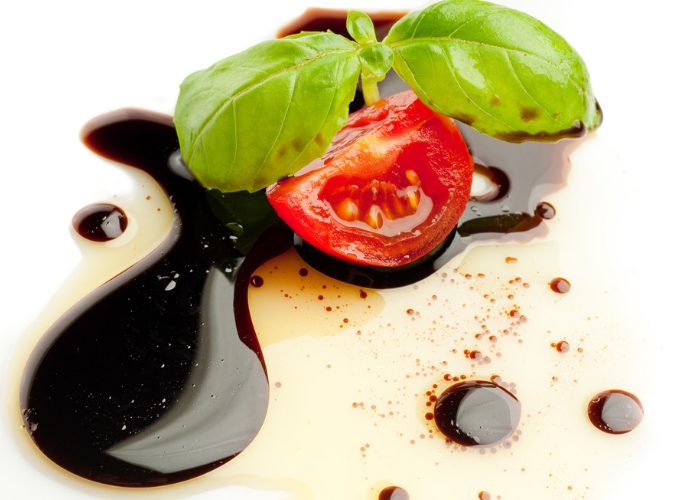
Vinegar is acidic, making it a great way of killing bacteria and reducing the chances of developing infection. This has beneficial health effects, as some of the most dangerous diseases such as E. Coli and MRSA risks are reduced by simply consuming 2 tablespoons of vinegar with food each day[1]. This small change to the diet can save you the risk of some of the deadliest diseases that claim the lives of thousands of Americans every year.
Combats diabetes effects and risks
One of the most amazing, unexpected benefits of vinegar is the reduction of blood sugar spikes associated with the onset of diabetes. The acetic acid in vinegar is fantastic for increasing the discard rates of sugar from the bloodstream, combatting insulin resistance[2]. Studies have shown the benefits of as little as 2 tablespoons of a 6% concentration acetic acid solution. This means that your regular distilled vinegar will provide these great effects, even if it is not as good for you as other fruit-based vinegars.
Reduces insulin sensitivity

Insulin resistance is not only a problem in diabetes, but also because of the role it plays in the storage of body fat. When you eat food, the carbohydrates are broken down into glucose, after which the insulin in your bloodstream plays a role in determining whether they will be used or stored as fat. With insulin resistance, the utilization of carbohydrates for energy decreases and more is stored as body fat – this means that you’re likely to be hungrier and store more fat [2].
Curbs appetite
Vinegar also has the novel effect of reducing the appetite simply by being unpleasant to consume! Research has suggested that one of the most important ways that vinegar contributes to weight loss is through inducing a mild sense of nausea. The research suggests that there are huge benefits to the use of vinegar in this way, as the discomfort associated with concentrated acetic acid in the stomach reduces the appetite, thereby boosting the ability to maintain a calorie deficit and avoiding the consumption of high-calorie foods[3].
Burns fat
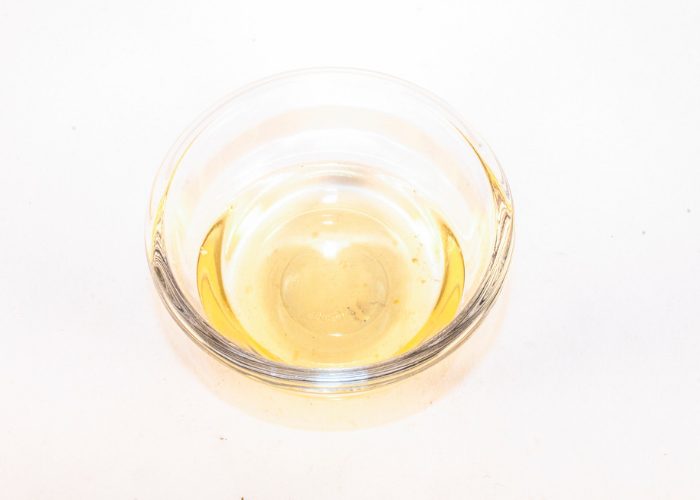
Not only do vinegars combat the storage of fat, but they actively increase the body’s metabolism of existing fat stores. By modulating a hormone known as AMPK, vinegar increases the body’s tendency to burn fat with some significant results. In a 12-week study that controlled for variables like calories consumed, the consumption of a 30ml dose of vinegar with meals increased weight loss by approximately 5 pounds[4].
This may not be a massive amount of weight to lose in 3 months, but if you consider that this was not on a calorie-restricted diet, and with all test participants performing similar levels of exercise (measured by pedometer), it is great evidence to support the fat-burning effects of regular vinegar consumption.
Combats development of fat
Vinegar is also involved in the reduction of fat gained while maintaining a calorie surplus, making it a potential buffer against gaining weight during lapses in the diet. This is primarily achieved through the adjustment of insulin sensitivity and corresponding reduction in the storage of carbohydrates as fat, but is also achieved by increasing the physiological signalling that food is fuel.
Early research suggests that AMPK modulation increases the value of NEAT (non-exercise activity thermogenesis), compensating for excessive calorie intake, and reduces the pathway that drives fat storage[5].
Combats liver disease

One of the most important things about vinegar’s effects on fat is the ability to combat the development of particular forms of dangerous fat known as visceral fat. Visceral fat builds up around the organs and contributes to some of the most dangerous diseases in America today, from heart attack to Alzheimer’s disease. Liver disease is not as often discussed in relation to excessive amounts of visceral fat, but fatty liver disease is a common killer.
Because of this tendency to preferentially reduce visceral fat (rather than the less-dangerous subcutaneous fat that is found under the skin), vinegar reduces your risk of liver disease. In addition to the reduced burden placed on the liver by proper insulin sensitivity and reduced body fat, vinegar combats the development of fat build-up in the organ itself and can increase your quality of life.
Combats heart disease
Heart disease is the most common cause of death in the United States, even when compared to man-made causes such as motor accidents – nearly 1 in 100 people will die from heart disease in any given year. Vinegar intake can curb your risk of developing heart disease in a number of ways, adding up to a serious boost to your health and longevity.
As discussed above, vinegar has profound effects on the body’s ability to metabolize fat (particularly visceral fat) and it reduces excessive fat build-up[6]. This also means a reduced concentration of fats in the blood, both cholesterols and triglycerides, which can reduce the risk of hyperlipidemia and high blood pressure, both of which are serious risk factors in the development of heart disease among adults[7].
Fruit vinegars decrease inflammation
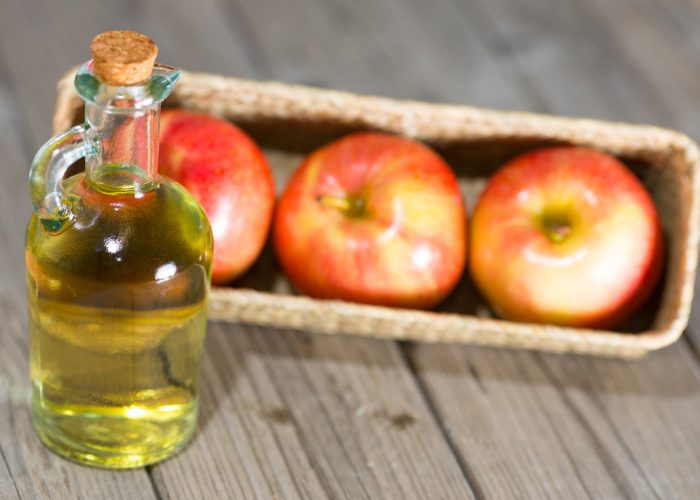
Fruit vinegars have benefits over the common distilled vinegar you’re likely to have at home. While the grains used to produce distilled vinegars are healthy when consumed whole, they do not have the same positive qualities when distilled. Conversely, fruit and vegetable-based vinegars contain some of the phytonutrients found in the plants they were distilled from.
Phytonutrients are a broad class of nutrients and chemicals that are found specifically in plant foods and drinks. These smaller nutrients have a wide variety of effects and the different types of vinegars will have their own unique blend of phytonutrients and the health benefits associated with them. However, the general benefits of phytonutrients tend to be reduced incidence of heart disease, less oxidative stress and anti-inflammatory properties[8].
Reduced risk for cancer
Oxidative stress is a major player in the risk of developing a variety of cancers, meaning that something as simple as increased fruit vinegar in your diet can increase your protection against a variety of cancers and other dangerous mutations.
Dosing and Dangers
The health benefits of vinegar mentioned above are achieved easily through a relatively small quantity of vinegar in the diet, with as little as 2 teaspoons having profound effects. However, consuming too much vinegar or an excessively-concentrated vinegar can cause some serious health issues, so caution is advised.
Consuming more than the recommended 30ml throughout the day can contribute to negative effects on the digestive system. This is related to the fact that vinegar is still a highly acidic food and too much can disrupt the pH balance in the intestines. Alternatively, drinking vinegar without food or sufficient dilution can cause the development of acid burns or lesions in the throat or stomach.

Conclusion: Should Your Diet Include More Vinegar?
There are some great health benefits associated with dietary vinegar intake, but its important to look at them as part of a whole diet and not a miracle solution. The combination of a small, supplementary amount of vinegar has some promising early research but it’s equally important to control the dosage and be sure to dilute it with other liquids or by using it as a dressing for foods.
The best approach to fat loss, blood sugar regulation, and many other heath markers is a well-rounded diet, but the addition of vinegar seems to be a promising choice. For the best results, add vinegar to meals that are high in carbohydrates, such as potatoes and other starches – the GI-mediating effects are less effective during meals with high fiber content.
References
- [1] Medina, Eduardo. “Antimicrobial Activity of Olive Oil, Vinegar, and Various Beverages Against Foodborne Pathogens.” Journal of Food Protection. 2007 May; 70(5). <http://www.jfoodprotection.org/doi/abs/10.4315/0362-028X-70.5.1194?code=fopr-site>
- [2] White, Andrea. “Vinegar Ingestion at Bedtime Moderates Waking Glucose Concentrations in Adults with Well-Controlled Type 2 Diabetes.” Diabetes Care. 2007 Nov; 30(11): 2814-15. <http://care.diabetesjournals.org/content/30/11/2814.short>
- [3] Darzi, J. “Influence of the Tolerability of Vinegar As an Oral Source of Short-Chain Fatty Acids on Appetite Control and Food Intake.” International Journal of Obesity. 2014; 38, 678-681. <https://www.nature.com/articles/ijo2013157>
- [4] Petsiou, Eleni. “Effect and Mechanisms of Action of Vinegar on Glucose Metabolism, Lipid Profile, and Bodyweight.” Nutrition Reviews. 2014 Aug; 72(10): 651-661. <http://onlinelibrary.wiley.com/doi/10.1111/nure.12125/full>
- [5] Petsiou, Eleni. “Effect and Mechanisms of Action of Vinegar on Glucose Metabolism, Lipid Profile, and Bodyweight.” Nutrition Reviews. 2014 Aug; 72(10): 651-661. <http://onlinelibrary.wiley.com/doi/10.1111/nure.12125/full>
- [6] Kondo, Tomoo. “Vinegar Intake Reduces Bodyweight, Body Fat Mass, and Serum Triglycericde Levels in Obese Japanese Subjects.” Bioscience, Biotechnology, and Biochemistry. 2014 May; 73(8): 1837-43. <http://www.tandfonline.com/doi/abs/10.1271/bbb.90231>
- [7] Kopelman, P. “Health Risks Associated with Overweight and Obesity.” Obesity Reviews. 2007 Feb; 8(1): 13-17. < http://onlinelibrary.wiley.com/doi/10.1111/j.1467-789X.2007.00311.x/full>
- [8] Drewnowski, Adam. “Bitter Taste, Phytonutrients, and the Consumer.” The American Journal of Clinical Nutrition. 2000 Dec; 72(6): 1424-35. <http://ajcn.nutrition.org/content/72/6/1424.short>








